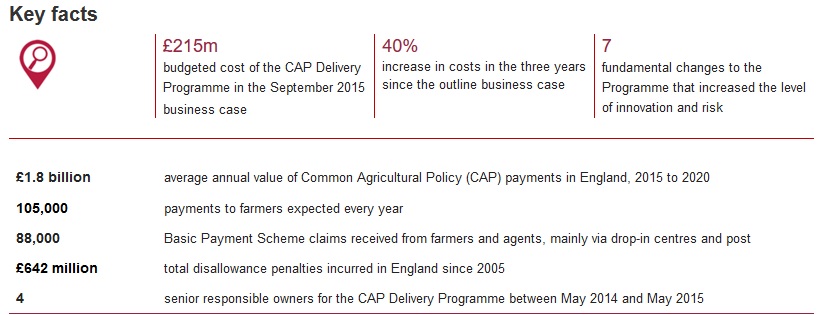
Defra may have to pay fines of up to £180 million per year because of a botched implementation of an IT system connected to farmers' Common Agricultural Payments, the National Audit Office said today.
As 30,000 farmers in England were due to receive their BPS payments today, the Audit Office said ineffective collaboration between the bodies responsible for the CAP Delivery Programme undermined their ability to deliver a successful rural payments service.
A spokesman for the Department for Environment, Food and Rural Affairs stated: “The new Common Agricultural Policy (CAP) is widely acknowledged as the most complex ever and a new IT system was needed to handle this additional complexity and to make claiming as simple as possible for farmers.
“While there was a problem with one part of the online interface that enabled farmers to put data directly into Rural Payments, the system has always worked and has successfully started making accurate payments to thousands of farmers on the very first day of the payment window.

“The Rural Payments system will be further improved next year to make it easier for farmers to apply for their CAP payments.”
The Programme is a combined effort between Defra, the Rural Payments Agency, Government Digital Service (GDS) and other bodies to develop new systems and processes to support the implementation of the Common Agricultural Policy in England.
It was established in 2012 to address failings in how it was previously delivered and adapt to the increased complexity of the new Common Agricultural Policy.
The original vision and design of the Programme was narrow, according to the NAO.
It focused largely on procuring IT systems and did not set out the wider organisational transformation required.
In 2013, the Cabinet Office applied spending controls which introduced innovation, but also increased the risk that the Programme would fail to deliver.
Today’s report found that the Programme has been set back by numerous changes in leadership.
There were four senior responsible owners within the space of a year, each bringing their own style and priorities.
Repeated changes were disruptive to the Programme and caused uncertainty and confusion for its staff. The Department failed to prevent counter-productive behaviours, with deep rifts in working relationships and inappropriate behaviour at the senior leadership level at many stages of the Programme’s three-year history.
GDS did not provide the support the Department believed it needed to adapt to the changes during the spend control process.
While GDS committed to reducing the overall programme costs, improving the delivery confidence of the programme and building the Department’s digital capability, its support was reported to be patchy and with limited continuity in personnel.
The Department expected applicants to be able to register using the government’s identity assurance system, Verify, from October 2014.
Although the Verify team had advised the Department that they would need to make alternative means available to access the service, Verify was not sufficiently ready for widespread use by farmers in October 2014 and no alternative was initially put in place. The vast majority of customers, therefore, registered using the RPA’s existing process, supported by drop-in centres and the RPA’s telephone helpline.
In March 2015, in response to serious failings of the system, the online application system was withdrawn and replaced by “paper-assisted digital” applications for the 2015 scheme.
This was a speedy and effective change to the Programme that has increased the likelihood that the majority of farmers will receive their basic payment scheme (BPS) payments in December.
The NAO found however that the focus on resolving immediate issues has diverted attention from long-term goals of improving the service to farmers, minimising future EC penalties and achieving other intended benefits such as addressing the land data issues that are causing current penalties.
CLA President Ross Murray commented on today's news: “The National Audit Office report today confirms concerns we raised earlier this year over the delivery of vital payments to farmers. The short term increase in costs due to the implementation of contingency plans is regrettable but no surprise. The technology failed, short and simple. It was necessary for the Rural Payments Agency to go manual to make sure farmers were paid this year. We will continue to work with Defra and the Rural Payments Agency to build on the National Audit Office’s recommendations for creating a cost efficient, accessible and user friendly system for payments. We also need the rural broadband roll-out.”
